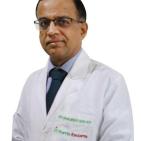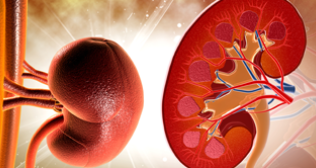
World Kidney Day - Dr Sanjeev Gulati
Kidney disease is a non-communicable disease (NCD) and currently affects around 850 million people worldwide. One in ten adults has Chronic Kidney Disease (CKD). The global burden of CKD is increasing, and is projected to become the 5th most common cause of years of life lost globally by 2040.Thetrueburdenofend-stage kidney Disease(ESKD) in India is not known, with few dedicated centres for care of such patients, lack of universal access to renal replacement therapy (RRT), and absence of a national registry. In the absence of universal government funding like in USA and UK, the cost of dialysis and kidney transplant is borne by the patient’s family pushing many of them into debt. It remains beyond the reach of the vast majority.
Hypertension and kidney disease are closely related. Hypertension is one of the commonest causes of chronic kidney disease all over the world. High blood pressure may be the only sign of underlying kidney disease and poor blood pressure control can cause rapid worsening of kidney functions. In fact the cause of hypertension lies in the kidney which controls the salt and water balance. There is excessive salt retention in most patients with essential hypertension. Most patients with high blood pressure often rush to the Cardiologist. Dr Gulati says that it is imperative that they see a nephrologist as well as this could be the only sign of underlying kidney disease. Hypertension is largely a preventable cause of CKD. If blood pressure is checked and controlled with use of medications CKD can be prevented in the vast majority of patients. The most important measure in controlling blood pressure is to take low amount of salt. Indians, Dr Gulati says are one of the most voracious salt eaters on the planet and cannot have their meals without the deadly quartered of “Achaar, Chutney, papad and Raita”. If patients with hypertension reduce their salt intake to 3 gm/day their requirement of medicines will come down dramatically and in some cases they might not even require BP medicines. My slogan for preventing hypertension is “Ek Chammach KUM”.This should be propagated not amongst the patients but also in the general population notably housewives and even chefs so that they limit the slat in their cooking. Thus control of BP is one of the 8 golden rules of preventing Kidney Diseases.
This year the theme of World Kidney Day is Kidney Health for Everyone Everywhere – from Prevention to Detection and Equitable Access to Care. The aim is to continue to raise awareness of the increasing burden of kidney diseases world wide and to highlight simple measures for prevention and detection of CKD for everyone, everywhere. Dr Sanjeev Gulati, Director Nephrology and Kidney Transplant, Fortis Group of Hospitals, NCR says that Kidney disease can be prevented by following the 8 golden rules:
- Keep fit and be active.
- Eat a healthy diet.
- Check and control your blood sugar.
- Check and Control your blood pressure.
- Take appropriate fluid intake.
- Don’t smoke.
- Don’ttakeover-the-Counteranti-inflammatory/pain-killerpillsregularly.
- Get your kidney function checked regularly.
If you are diagnosed to have chronic kidney disease progression to end-stage kidney disease can be delayed with appropriate access to basic diagnostic tests and simple interventions. Dr Gulati also advises people to stay away from alternative systems of medicine as there is no good scientific proof of their efficacy. On the contrary they may hasten the progression to kidney failure.
Dr Sanjeev Gulati
Director Nephrology and Kidney Transplant
Fortis Group Of Hospitals, NCR
Categories
Clear allMeet the doctor

- Nephrology | Nephrology
- Organ Transplant | Kidney Transplant
-
31 Years
-
1800
 Available at 1 different locations
Available at 1 different locations




















